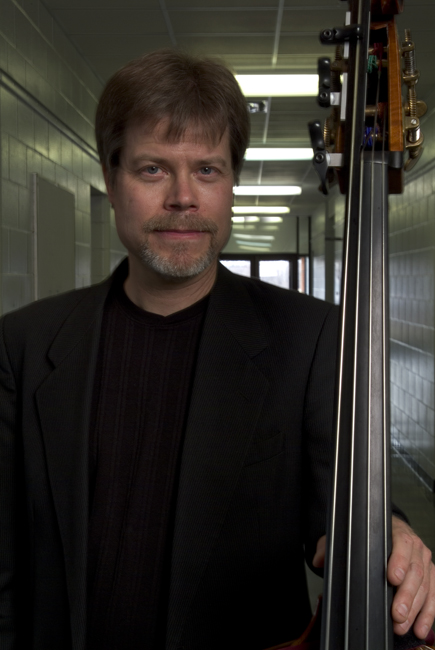Learn
University Classes
Educational Videos
Private Instruction / Jazz at UofL
Due to my full teaching load at the the University of Louisville, I am unfortunately unable to take any regular private students outside of my jazz bass studio at the university due to time constraints. Exceptions to this general rule can be made for students who are considering applying to the jazz studies program at UofL, and certainly for anyone looking for help preparing their audition. If you don’t fall into either of these categories but are still looking for private jazz instruction for double bass in the Louisville area, feel free to contact me via email and I will do my best to help you find the right teacher for your needs.
UofL Jazz Bass Studio information
The studio usually has between 4-8 bassists at any given time. The school of music tries to keep the number of students in this range because we typically have six combos per semester, and 4-5 major ensembles. If we have too many bass students, there are not enough ensembles to go around, and if we have too few bassists, there are too many ensembles and bassists will play in more than one ensemble (this is often not at all a bad thing for the bassists). In my bass studio, I try to take a two step approach to the subject, which can be summarized as follows:
1) Teach students the basics in terms of jazz technique, concept and repertoire that will allow them to function in ensembles, play basic jazz gigs, and complete the requirements of the program.
2) Help students develop their own individual voice on the instrument, no matter what type or genre of music they intend to apply it to. This involves personalized technical study, instruction in various styles, and generally moving beyond the basics outlined in part 1 above. More importantly, though, this step really involves helping teach students to be good autodidacts; put another way, my real intent in this phase of study is to help teach each student how to think for themselves, and to solve musical, technical, and stylistic issues by careful analysis and examination of both the problem itself, and of the “self” attempting to solve the problem. In the end, my best teachers were those who didn’t give me a fish so that I wouldn’t go hungry that day, but rather those who taught me the art of fishing so that with a little effort and determination I need never go hungry again. In this phase of study, I do the best I can to emulate my best teachers in this regard.
Some students never get far beyond step 1 as described above. There may be many reasons for this, but most commonly such a student may be focusing their energy on some other aspect of their musical or general education (students who are double majoring often find themselves in this situation). This is a choice, and as long as the student makes it openly and honestly and owns their decision, I do not question it often (I may, however, check in from time to time on the subject to make sure they are getting all they want out of their bass studies!). Other students are voracious in their appetite to master the art of bass playing and wish to get to step 2 as quickly as possible. These students carefully line up the requirements for each semester and fulfill them as early as possible so that they can focus the majority of their studies on step 2; this is also a choice, and I never question it as long as the basic requirements are fulfilled. In fact, those lessons where a student who has completely completed their semester requirements (and prepared for their playing exam) comes in with a topic to explore and a specific musical problem to address are my favorite form of teaching.
Basic Requirements and Instructional Method
Each semester, each student is required to prepare and memorize a minimum of 4-5 pieces from the standard jazz repertoire. On the end of semester playing exam, the student plays selections from their repertoire along with jazz rhythm section faculty. Bass students are expected to play the melody, improvise and accompanying line in the style of the piece while a faculty soloist plays an improvised solo, then play an improvised solo over the changes of the piece. In addition, students beyond the first semester freshman level are also required to transcribe an improvised solo from a jazz master and to play along with the original recording that the transcription was taken from. Students who require training in or honing of transcription skills are free to make time for this instruction in their weekly lessons
For the basic method that I use in approaching most repertoire, please see this document: Bass Study Method (Repertoire and Improv) This page is the last page of every applied jazz bass syllabus, no matter what the level. This method (or parts of it, depending on the circumstance) is the exact same method I use to learn repertoire and hone my skills.
For a basic list of what is considered “Standard Repertoire”, see this list: Repertoire List for Bass Study This page, while not exhaustive, represents a good place to start to choose tunes that are commonly known by many professional jazz musicians.
In addition, before the end of the sophomore year of study, all students must also pass a series of barrier exams showing that they have mastered basic skills related to the study of jazz improvisation. For a listing of the exam requirements, see this list: Senior College Barrier (Bass)
Opportunity for Secondary Classical Bass Study

Bass students who majoring in Jazz Studies at UofL also have the opportunity to take 4 semesters of secondary lessons. Most students choose to take these lessons in the area of applied classical bass, and to study with my colleague, great friend and master bassist Sidney King. Sid keeps a large studio of classical performance majors but is always open to teaching secondary lessons to jazz studies majors who are looking to expand their horizons and fortify their technique by studying traditional repertoire with the bow. Sid is a devoted and caring teacher who puts an incredible amount of energy and expertise into his teaching, and I strongly encourage all jazz bass students to avail themselves of his knowledge and input. Every single person who has done this has come through the experience a much stronger and better informed bassist. To this I can only add that Sid has been a great bass mentor to me as well, especially in my earlier years of playing when I was still forming many of the left hand techniques that I now espouse as a teacher.
If you are interested in studying privately with me at UofL, or have any questions about the program, please do not hesitate to send me an email. If I can’t answer your question, I’ll direct you to someone who can.
